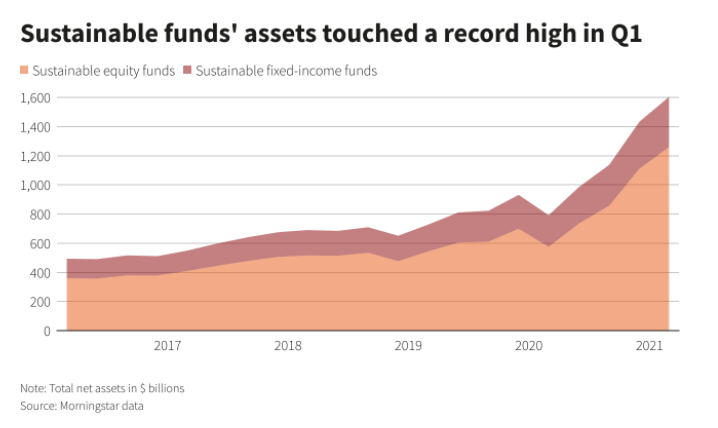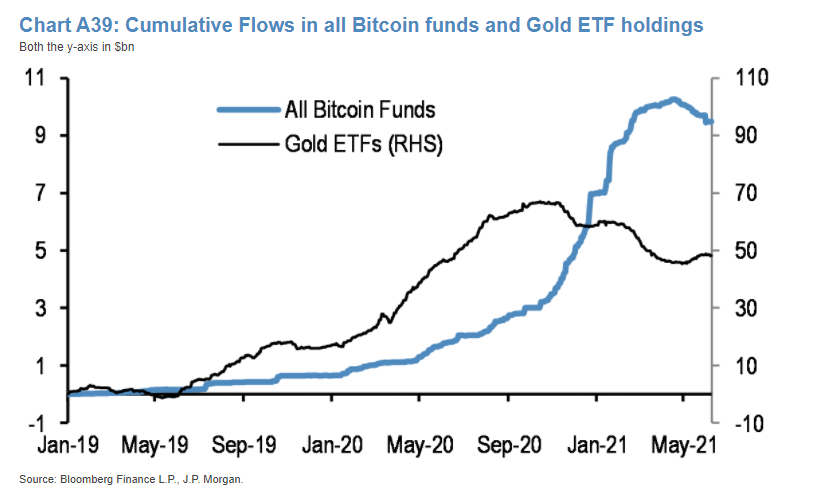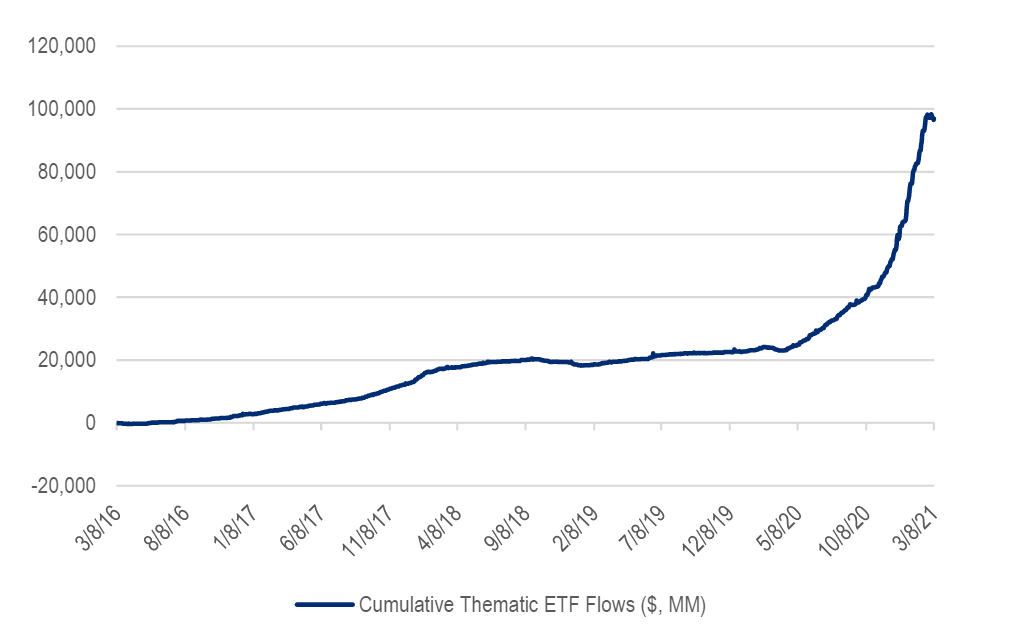The past year has seen markets rapidly evolve through a greater level of retail involvement and an enhanced focus on new asset classes and industries purported to offer a glimpse into our future.
At the centre of it all has been an acceleration of ESG trends, and the gradual acceptance of cryptocurrencies into the mainstream, whose total market cap now eclipses Australia’s GDP.
However, as momentum begins to slow, the question of whether or not these trends are here to stay has been posed.
Will Reddit’s Wall Street Bets army and retail investors continue to have the ability to move markets?
Will ESG continue to outperform under a backdrop of the increased social consciousness of investors?
The answers to these questions pose great implications for asset allocation decisions and will play a role in defining market performance in the years to come.
In today’s note, we will cover the various investment trends which have emerged, the differing ways in which investors have gained exposure, and what this will mean for asset allocation decisions in the coming years.
E$G
The past year has seen a significant acceleration of ESG investing, with investors continuing to integrate social and environmental impact into their investment decision making. Whilst we have touched on ESG in depth in the past (ESG investing, green bonds, solar, wind/water, geothermal/nuclear, and electric vehicles), it is important that we continue to do so, given the considerable ramifications it holds for shareholders and bondholders.
Corporates which do not satisfy ESG requirements will be excluded from ESG mandates, whose AUM will continue to grow and have a wider scope of impact.

Whether or not one believes in ESG investing is irrelevant – to take exposure in companies/issuers which take no consideration of ESG measures is a two-sided risk, where the company may experience a reduction in institutional fund flow, and may expose investors to industries set to decline on the backdrop of decarbonisation.
With the world’s largest asset manager, BlackRock, pledging to reach net zero emissions, and many others looking into similar initiatives, those worst emitting companies are likely to suffer despite potentially offering attractive balance sheet and valuation metrics.
Cryptocurrencies Taking Market Share from Gold
Whilst cryptocurrencies have taken a dive in recent months, a distinct shift in asset allocation has occurred, where the younger generation has preferred Bitcoin (a “digital gold”) over gold as a store of value asset.
This shift has occurred due to the perception of investors of its superiority at a functional level – being more portable, transferrable, divisible and scarce – with its ability to act as a settlement currency in real world transactions being an added benefit.
Moreover, bitcoin can be seen as somewhat of a monetary revolution – where a decentralised solution has been proposed by younger generations to fix the shortcomings of existing financial infrastructure overseen by older generations.
Cumulative Bitcoin and Gold ETF Flows

Source: JP Morgan
The chart above highlights the thematic of investors shifting away from gold and into bitcoin, however it must be noted that Bitcoin is scaled in 2bio increments, whilst gold is scaled in 20bio increments.
While we might not see bitcoin as a store of value asset in 5 year’s time, the market has learnt a valuable lesson about the ability of younger generations to shift the market away from the status quo, and towards a world which aligns with their own beliefs and wishes.
For further details on cryptocurrencies, see the following articles we have released in the past (Bitcoin & ESG, Cryptocurrencies Part 1, Cryptocurrencies Part 2).
Zero Commission Zero Worries
Along with a shift in asset allocation, markets have also evolved through the makeup of its investors.
Increasing rates of retail participation and the rise of zero commission trading has driven investment decision making processes informed by sentiment, and short-term outlooks.
At the centre of this all has been Robinhood, which has since forced its largest competitors in Charles Schwab and Fidelity into removing all trading commissions.
The impacts of such changes are evident through Gamestop (NYSE: GME) and AMC (NYSE: AMC), where zero commissions made it economically viable for investors to purchase single, or fractional shares.
The gamification of the investment process, through brighter colours, flashy graphics and conducive UI has supported this process, taking the focus away from fundamental analysis, and towards market sentiment and short-term returns.
The ETF(uture)
ETF’s have become an increasingly more prominent component within investor portfolios, with thematic ETF’s in particular experiencing significant growth over the past year.
Thematic ETF’s target specific trends, such as cybersecurity, cloud computing and electric vehicles, and enable investors to take up diversified exposures in niche industries in which they might have limited security specific knowledge.
For less seasoned investors, the ability to invest based on a narrative allows for greater involvement in the investment process, as opposed to simply investing in the index.
Cumulative Thematic Equity ETF Flows, 5 years

Source: Citi
However, thematic ETF’s do bring forward issues when they are focused on smaller industries – where large fund inflows can create bubble-like conditions due to insufficient liquidity in the underlying securities, or significant declines when these funds are withdrawn.
Herein lies the problem with thematic ETF’s, where investments are driven more from narratives, as opposed to underlying security fundamentals, creating market inefficiencies that will eventually be corrected.
Which Trends Will Stick Around?
Out of the four trends, ESG looks most likely to play the largest role within markets in the coming years.
ESG will likely continue to play a role in investment decision making in the years to come, with corporates likely to also continue building out on their own ESG qualifications.
ESG exposures can act as both a strategic long-term position, or as a hedge against carbon intensive positions within your portfolio.
Investors can gain exposures through diversified ETF’s, which invest in large cap companies screened on the basis of their ESG credentials, like the Xtrackers MSCI USA ESG Leaders ETF (NYSEARCA: USSG).
Diversified ESG ETF’s don’t necessarily invest in companies focused on environmental or social good, and select stocks on the basis of size, and their ESG credentials, with their largest positions including companies such as Microsoft and Alphabet.
For more direct exposure to the thematic, or as an environmental hedge, investments can utilise options such as iShares Global Clean Energy ETF (NASDAQ: ICLN), which tracks an index of clean energy related companies, including solar, wind, hydrogen and other renewable energy sources.

Source: Bloomberg
Where To Next?
Regardless of whether or not you believe in the longevity of certain market trends, it is imperative to understand the various ways in which they can affect the functioning of markets.
As with any trend, it is always bad to be on the losing side – even if you may end up being on correct in the long run.
With retail participation looking set to remain strong, investors must take account of differing and evolving influences on markets, where significant upside can be leveraged, and downside avoided.
As always, strong fundamental analysis of securities will serve as the basis for consistent and sustainable returns and will outperform short-term speculative investing over the long run.
The views expressed in this article are the views of the stated author as at the date published and are subject to change based on markets and other conditions. Past performance is not a reliable indicator of future performance. Mason Stevens is only providing general advice in providing this information. You should consider this information, along with all your other investments and strategies when assessing the appropriateness of the information to your individual circumstances. Mason Stevens and its associates and their respective directors and other staff each declare that they may hold interests in securities and/or earn fees or other benefits from transactions arising as a result of information contained in this article.



